To promote excellence in undergraduate research and education, GSA established the Undergraduate Travel Award, which supports travel costs for undergraduate members who are presenting at and attending a GSA conference.
Congratulations to the 2023 awardees!
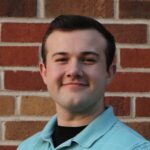
Trace Ackley
Truman State University
I genetically modify roundworms to help us better understand the sperm maturation process.

Morgan Apolonio
University of California, Berkeley
I research the possible correlation between long intergenic non-coding RNA (lincRNA) and tocochromanol (Vitamin E) abundance in maize using Genome Wide Association Studies and Transcriptome Wide Association Studies.

Nkechinye Baadi
Colby College
My research focuses on studying the role of the gene MMS21 in DNA damage repair and response pathways in S. Cerevisiae.
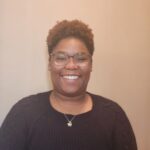
CeOnna Battle
Christopher Newport University
My research examines the connection between gut health and the aging process of the muscles and the brain using D. melanogaster.

Dimitrios Bikas
University of North Carolina, Chapel Hill
I interrogate the roles of KMT2C and KMT2D in chondrocyte differentiation and subsequent bone formation.
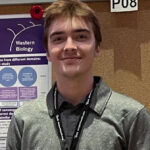
Joseph Butler
University of Western Ontario
My research pertains to genomic signature analysis using machine learning tools.

Jacqueline Cho
Brown University
My current research interests revolve around understanding how genetic variations impact sleep mechanisms and contribute to sleep disturbances. To explore this, I am employing the model organism C. elegans to investigate the role of GOA-1—a gene encoding a G-protein alpha(o) subunit involved in G-protein signaling complexes— in sleep.
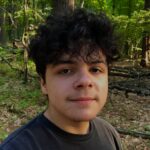
Arthur (Araceli) Colunga
University of Massachusetts, Lowell
I examine phenotypes arising from epigenetic modifications in the model C. elegans using immunofluorescence assays.
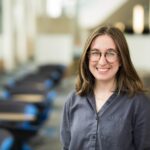
Lydia Cruce
Grand Valley State University
The research I am involved with is determining the in vivo role of the AANATL-7 gene in histamine metabolism and effects on the male reproductive system in Drosophila.
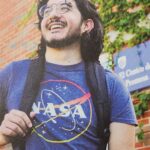
Ismael Curiel
Elmhurst University
We assessed the development of the nerve ring in GFP tagged C. elegans by measuring the expression levels of ADM-4 after incubation at 28 degrees Celsius.

Jayden Cyrus
Duke University
This project explores the role of various proteins, like Draper and Spastin, in neurodegeneration.

Madeline Daniel
Lewis and Clark College
I study the pathways of formation of lysosome-related organelles in the developing C. elegans embryo.

Leah Ding
Austin College
The PGM2 gene in yeast helps manage sugar levels and calcium balance which is crucial for many biological functions. Without PGM2, cells grow slower and struggle with maintaining proper calcium levels. I am currently investigating a relatively unexplored gene, YDL206W, to see how it might be connected to these problems and whether it could teach us more about similar issues in humans.
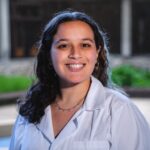
Julinette Gines-Garcia
Goucher College
We are using zebrafish (Danio rerio) to study the cell cycle dynamics of Müller glial cells in retinal neuron regeneration.

Lexis Grandel
College of the Holy Cross
I am in an undergraduate research lab that uses fruit flies to study how glia, a cell type in the brain, modulate seizure susceptibility.
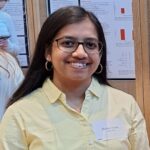
Rutuja Gupte
University of Wisconsin, Madison
I study the effects of mutations on the fitness of haploid and diploid yeast.

Reiley Heffern
University of Missouri, Columbia
I am currently investigating the genetic basis of learning and memory skills in D. melanogaster.

Tapasya Katta
University of Alabama, Birmingham
I am using yeast as a model organism to identify genes that play a role in the escape of mitochondrial DNA.

Iris Kazzi
West Chester University
I am currently exploring novel Intracellular Pathogen Response Triggers in C. elegans and analyzing the impact of ethanol on intestinal permeability and its implications for innate immunity in humans.
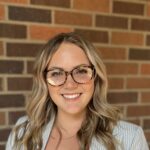
Eleanor Laufer
University of Oregon
My research investigates the evolutionary fitness of interacting genes which contribute to drug resistance in the model system C. elegans. We use novel genetic engineering and ultra large populations to track fitness over several generations.
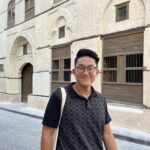
Nicolas Lee
University of Oregon
I am characterizing mutations that affect the heat tolerance of proteins in C. elegans cells responsible for reproduction.

Siqi (April) Li
New York University
My project aims to generate cell-type-specific genetic tools to study Drosophila neuronal development in the optic lobe.

Cheung Li
Colby College
My research focuses on deciphering the genetic interactions between the C-terminus of MMS21 and RAD5, two genes vital to the DNA damage response and repair system of budding yeast.

Kayla Ly
University of California, Irvine
My research aims to discover novel genes contributing to transposable element-mediated heterochromatin formation in D. melanogaster.

Jennifer Madu
Emmanuel College
I am investigating GEF and GTPase function in the mitotic exit network in S. cerevisiae by further analyzing the impact mutated MEN proteins has on regulation and activation of growth

Sergio Moreira-Antepara
Cornell University
I use genetic approaches to study the regulation of body size and BMP signaling in C. elegans.

Mai Tien Nguyen
Colorado College
My research looks at the inventory of inner kinetochore proteins in budding yeasts, which are important for accurate chromosome segregation. This offers insights into the coevolution of centromeric DNA sequences and associated proteins, providing directions for future experimental work in the lab.

Mara Stout
Morehead State University
I am investigating linear versus circular chromosome structure during cellular division.

Mingyang Tang
Bryn Mawr College
My research strives to understand how changes in DNA chemistry affect gene expression, specifically the mechanisms responsible for establishing and maintaining these chemical modifications.
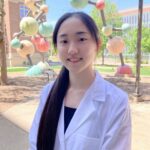
Erika Tsukamoto
University of Minnesota, Twin Cities
I am investigating the mechanism of maternal mRNA clearance during the oocyte-to-embryo transition in C. elegans.
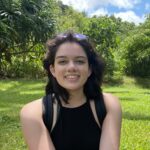
Zoe Upham
San Jose State University
I am investigating how the cells that form the intestinal lining coordinate themselves to create a hollow tube capable of digestion, and I am specifically interested in understanding the roles of two highly conserved proteins, PAR-1/MARK and UBA-2/UBA2, in this process.

Peri Wivell
George Washington University
My research involves studying the role of macrophage populations during development and in diseases of the prostate.



